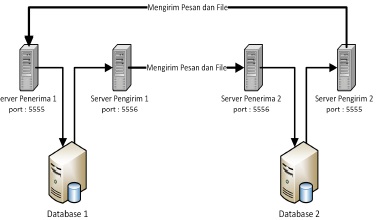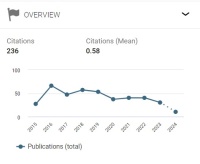Rancang Bangun Aplikasi File Transfer Menggunakan Library ZeroMQ
Abstract
Sending data with large data sizes between two or more computers in a company is affected by various factors, both the network connection of the two computers to the data exchange method used, one method that can be used is the ZeroMQ library. The method of sending files using the ZeroMQ method is relatively faster because the architecture is brokerless or without middleware as an intermediary so that the process of sending files can be done quickly and can blow up the resources used. The ZeroMQ method was originally created to send messages, but we can add file conversion algorithms to binary numbers, so the messages sent are binary numbers from encoded files. This application is built on the Python programming language so that it is easier to develop again. The results of the design of file transfer applications using the ZeroMQ library performed on two server computers and client computers explain that this method can be used to send files and from the results of the test the time required and the latency value is relatively faster and more stable.
Downloads
References
[2] W. Sardjono and T. Pujadi, “Performance evaluation of systems Managed File Transfer in banking industry using IT Balanced Scorecard,” in International Conference on Information Management and Technology (ICIMTech), Bandung, Indonesia, 2016.
[3] I. P. A. P. Wibawa, I. D. Giriantari and M. Sudarma, “Komputasi Paralel Menggunakan Model Message Passing Pada SIM RS (Sistem Informasi Manajemen Rumah Sakit),” Majalah Ilmiah Teknologi Elektro, vol. 17, no. 3, pp. 439-444, 2017.
[4] Y. S. Aljarbou, “Large File Transfer Using Multicast and P2P for Error Checking and Correction,” in 2019 2nd International Conference on Computer Applications & Information Security (ICCAIS), Riyadh, Saudi Arabia, Saudi Arabia, 2019.
[5] S. C. U. o. T. G. C. Gao Ying Sch. of Comput. Sci. & Eng., L. GuanYao and H. JianCong, “A New Method of File Transfer in Computational Grid Using P2P Technique,” in International Conference on Network Computing and Information Security, Guilin, China, 2011.
[6] I. G. J. Arissaputra, I. M. Sukarsa, P. W. Buana and N. W. Wisswani, “Binary Log Design for One-Way Data Replication with ZeroMQ,” I.J. Modern Education and Computer Science, vol. 10, pp. 22-30, 2018.
[7] D. Ruwaida and D. Kurnia, “RANCANG BANGUN FILE TRANSFER PROTOCOL (FTP) DENGAN PENGAMANAN OPEN SSL PADA JARINGAN VPN MIKROTIK DI SMKS DWIWARNA. CESS,” Journal of Computer Engineering, System and Science, vol. 3, no. 1, pp. 45-49, 2019.
[8] L. Zhang, X. Wang and Y. Yaoqi, “Time Delay Performance Analysis of Distributed Communication Platform Based on ZeroMQ,” in International Conference on Communications, Information System and Computer Engineering (CISCE), Haikou, China, China, 2019.
[9] J. Moore, A. Arcia-Moret, P. Yadav, R. Mortier, A. Brown and D. McAuley, “Zest: REST over ZeroMQ,” in IEEE International Conference on Pervasive Computing and Communications Workshops (PerCom Workshops), Kyoto, Japan, Japan, 2019.
[10] L. Thurne, “Pandapower—An Open-Source Python Tool for Convenient Modeling, Analysis, and Optimization of Electric Power Systems,” IEEE Transactions on Power Systems, vol. 33, no. 6, pp. 6510 - 6521, 2018.
[11] I. M. Sukarsa, “APLIKASI KONVERSI FLOWCHART KE KODE PROGRAM BAHASA PEMROGRAMAN PL/SQL MYSQL,” Majalah Ilmiah Teknologi Elektro, vol. 8, no. 2, pp. 2503-2372, 2019.


This work is licensed under a Creative Commons Attribution-NonCommercial-NoDerivatives 4.0 International License.

This work is licensed under a Creative Commons Attribution 4.0 International License




